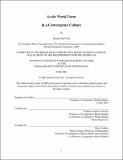| dc.contributor.advisor | William Charles Uricchio. | en_US |
| dc.contributor.author | Ford, Samuel Earl | en_US |
| dc.contributor.other | Massachusetts Institute of Technology. Dept. of Comparative Media Studies. | en_US |
| dc.date.accessioned | 2007-10-19T21:05:08Z | |
| dc.date.available | 2007-10-19T21:05:08Z | |
| dc.date.copyright | 2007 | en_US |
| dc.date.issued | 2007 | en_US |
| dc.identifier.uri | http://hdl.handle.net/1721.1/39223 | |
| dc.description | Thesis (S.M.)--Massachusetts Institute of Technology, Dept. of Comparative Media Studies, 2007. | en_US |
| dc.description | This electronic version was submitted by the student author. The certified thesis is available in the Institute Archives and Special Collections. | en_US |
| dc.description | Includes bibliographical references. | en_US |
| dc.description.abstract | The American daytime serial drama is among the oldest television genres and remains a vital part of the television lineup for ABC and CBS as what this thesis calls an immersive story world. However, many within the television industry are now predicting that the genre will fade into obscurity after two decades of declining ratings. This study outlines how the soap opera industry is and could be further adapting to the technological and social changes of a convergence culture to maintain and revitalize the genre's relevance for viewers and advertisers alike. CBS/Procter and Gamble Productions/TeleVest's As the World Turns will serve as a case study for these changes. This project examines how the existing fan base plays an active role in gaining and maintaining new fans by researching historical and contemporary examples of social relationships that fans form with other fans and the show itself. In addition to looking at how these fan communities operate, this thesis focuses on how soap operas have adapted and might adapt to alternate revenue models such as product placement, capitalize on their vast content archives, and tell stories through multiple media formats. The study concludes that soap operas should be managed as brands and not ephemeral television content because of their permanence in the television landscape, that fans outside the target advertising demographic should be empowered as proselytizers for the show, and that a transgenerational storytelling approach best utilizes the power of the genre to tell its stories. | en_US |
| dc.description.statementofresponsibility | by Samuel Earl Ford. | en_US |
| dc.format.extent | 176 p. | en_US |
| dc.language.iso | eng | en_US |
| dc.publisher | Massachusetts Institute of Technology | en_US |
| dc.rights | M.I.T. theses are protected by copyright. They may be viewed from this source for any purpose, but reproduction or distribution in any format is prohibited without written permission. See provided URL for inquiries about permission. | en_US |
| dc.rights.uri | http://dspace.mit.edu/handle/1721.1/7582 | |
| dc.subject | Comparative Media Studies. | en_US |
| dc.subject.lcsh | As the world turns (Television program) | en_US |
| dc.title | As the world turns in a convergence culture | en_US |
| dc.type | Thesis | en_US |
| dc.description.degree | S.M. | en_US |
| dc.identifier.oclc | 166228334 | en_US |
